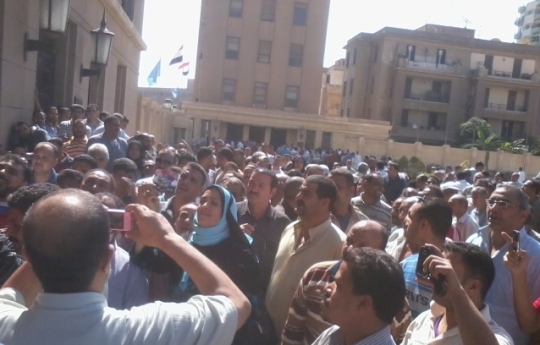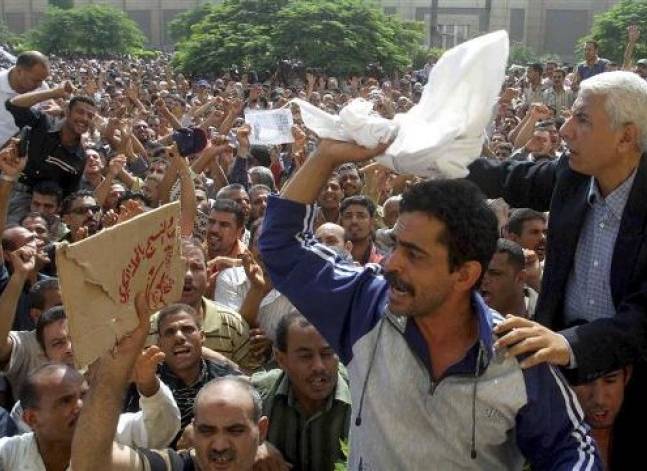Latest NEWS
- Aswat Masriya, the last word
- Roundup of Egypt's press headlines on March 15, 2017
- Roundup of Egypt's press headlines on March 14, 2017
- Former Egyptian President Hosni Mubarak to be released: lawyer
- Roundup of Egypt's press headlines on March 13, 2017
- Egypt's capital set to grow by half a million in 2017
- Egypt's wheat reserves to double with start of harvest -supply min
- Roundup of Egypt's press headlines on March 12, 2017
Cabinet approves law regulating labour unions
Workers carry sacks of rice in the Nile Delta town of Mansoura city, 210 km (130 miles) north of Cairo, in a file photo. REUTERS/Nasser Nuri
CAIRO, Jul 4 (Aswat Masriya) - Egypt's Cabinet of Ministers approved a draft law pertaining to the organisation of trade unions on Monday.
The cabinet said the approval comes in the light of "the State's keenness to provide an appropriate atmosphere in the work and production sectors" through organising entities representing workers in these sectors.
According to the bill, the trade unions aim to protect the legitimate rights of its members, attend to their common interests and work to improve their employment terms and conditions.
The unions also aim to " achieve decentralisation through participating in discussions of draft laws and regulations that affect the rights and interests of workers."
The House of Representatives approved the draft bill last May.
In line with the 1976 Trade Union Law, the Egyptian government does not recognise independent unions, which emerged in 2008 and started to proliferate after the 2011 Uprising.
Only the unions operating under the umbrella of the state-controlled Egyptian Trade Union Federation, established in 1957, are recognised by the government.
The 2011 Uprising, which ended the 30-year-long rule of former president Hosni Mubarak, had heralded some independence for trade unions, the U.S.-based international watchdog Human Rights Watch said in a May report.
Last June, the administrative court referred a lawsuit calling for the dissolution of independent trade unions to the Supreme Constitutional court.
Khaled Ali, a prominent rights lawyer who is working on the case, said on his social media account that the court has responded to the defence team and referred the 1976 Trade Union Law to the Supreme Constitutional court "to rule on the constitutionality of the provisions that deprive the working class of trade union freedoms and the right to organise."
The General Union of Tax, Finance and Customs Employees, which is affiliated to the state-controlled Egyptian Trade Union Federation, is the institution that filed the lawsuit against the independent trade unions.
The lawsuit called for voiding the formation of independent unions and syndicates, including the Egyptian Federation of Independent Trade Unions, the General Union of Real Estate Tax, the General Trade Union of Workers of Sales Taxes, and the General Trade Union of Workers of Public Taxes.
The lawsuit also demanded the cancellation of the decision allowing independent trade unions to open bank accounts and sought to bar unions from issuing membership subscriptions.
On May 1 which coincides with Labour Day, Human Rights Watch called on Egypt to “end the decades-old single official union system.”
Egypt's constitution stipulates that the state “shall protect workers’ rights.”
A wave of recurrent workers’ strikes, which began in late 2006, shaped the build-up to the 2011 Uprising.
The wave started with a strike in December 2006 by the workers of the Mahalla textile workers.
In April 2008, the Mahallah textile workers had planned another strike to protest the increased cost of living and low wages.
The strike attempt was thwarted, which pushed workers to take to the streets and clash with security forces. Calls for solidarity led to street clashes with police and the birth of the April 6 Youth Movement, one of the groups that electrified the January uprising.














